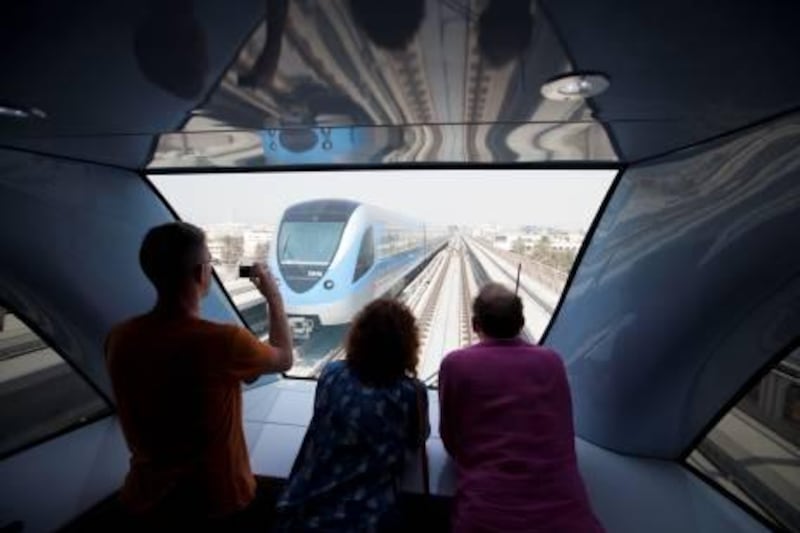DUBAI // Thirty Emiratis have been employed to fill positions created by the opening of the Dubai Metro Green Line.
The move is part of a Roads and Transport Authority (RTA) programme to have Emiratis in 30 to 50 per cent of leadership and supervisory jobs within the first five years of the Metro's operation.
MORE ON EMIRATISATION
Emiratis 'need more training on the job' Emiratis and job experts say there is a need for more on-the-job training to help UAE nationals become better integrated into the private workforce. Read article
1,400 teachers to lose their jobs by end of year Move is part of Emiratisation plan and will also see male teachers replaced with females in lower grades. Read article
COMMENT: Emiratisation goals rely on expatriates as part of solution If Emiratisation is to succeed, expatriates in the private sector will have to have an incentive to help make it succeed. Read article
Fatima Salmin, the Emiratisation manager at Serco, the international company that runs Dubai Metro, said: "Our long-term vision is to support the employment of Emiratis towards running their own railway in the future."
Mattar Al Tayer, the chairman of the board and executive director of the RTA, said the authority conducted audits to confirm Serco's commitment to Emiratisation was being carried out.
"The company has been directed to limit the recruitment of enforcement officers, front-end employees and ticket collectors exclusively to Emiratis," Mr Al Tayer said.
Serco approached the Dubai Emiratisation consultancy Next Level for help in finding citizens willing to be part of the project.
Hiring Emiratis for the Metro was not straightforward: of 120 Emiratis who attended two open days for interviews, only 30 passed a prerequisite assessment for entering the rail industry.
"When you want to recruit Emiratis you have to understand they are not only motivated by financial incentives," said Abdulmuttalib Al Hashimi, the managing director of Next Level, which is the only Emirati recruitment consultancy run by nationals and part of the Sheikh Mohammed bin Rashid Establishment for Young Business Leaders.
"You have to find what buttons to press to appeal to them and understand their psyche."
Kawthar Al Kitani, 28, said job satisfaction was far more important to her than salary.
"Even though this job pays me a lot less than my previous one and I have a lower position, it doesn't matter to me," Ms Al Kitani said.
"What matters to me is that they care for their employees and their career development."
She joined the Metro in July this year as a stationmaster.
"Salary is the last thing on my mind," Ms Al Kitani said. "The best thing about this job is that you are always learning and still working at the same time."
Mr Al Hashimi, who interviewed all of the candidates, said he explained the broader benefits of the job to them.
"They want to know confidently where they will be in the three to five years' time in terms of career development," he said. "They want to be part of something they can be proud of, and know they are part of something big, and be patriotic."
Sumaiya Abdul Rahman, 32, a mother of three who has also been employed as a stationmaster, said: "This is my dream job. I am in charge of the whole station and its equipment, and responsible for staff."
Mohammed Humaid, 34, said he applied because he wanted a new challenge.
"I decided to give the Metro a chance," said Mr Humaid, who is also a trainee stationmaster. "It's a new industry in the region and everybody likes to be part of the latest and advanced technology - especially a nerd like me."
Mr Humaid's wife is expecting next month and he thinks the Metro's shift work will allow him to help his wife raise their child without the need of maids.
"A message to all my brothers and sisters in the UAE: the harder you work, the more reward you will get," he said. "If you work hard, you will get the fruits of your work."
Eman Al Kindi, 28, who works as an information controller in the operations room, said she liked the unpredictability of the job.
"I liked my previous job but I didn't like the routine," said Ms Al Kindi, who worked at an IT company for four years before joining the Green Line. "I thought it would be more fun and I don't regret taking this job.
"I just wish to see more locals who are not scared of this job. My heart hurts when I see expats running the Metro."
Mr Al Hashimi said the times were changing.
"We had people coming all the way from Ras Al Khaimah, and there was a person who cut short his holiday just to attend the interview," he said.
"Who would have thought that Emiratis would work in the Metro project and be a ticket inspector? This is the biggest example that the market has changed."






